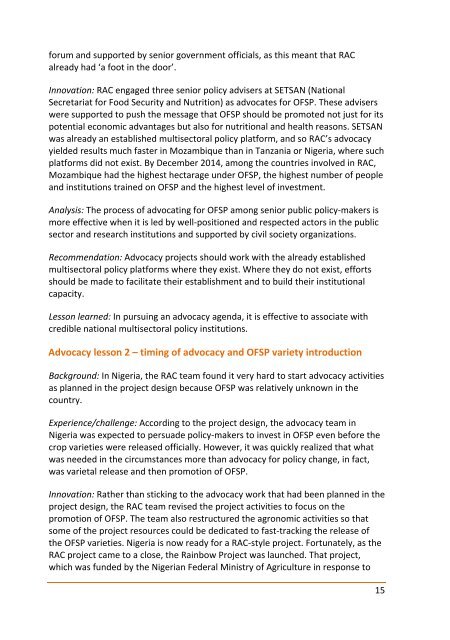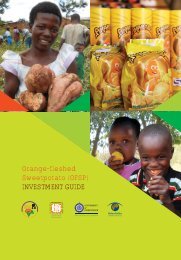Recommendation
Up89Y
Up89Y
You also want an ePaper? Increase the reach of your titles
YUMPU automatically turns print PDFs into web optimized ePapers that Google loves.
forum and supported by senior government officials, as this meant that RAC<br />
already had ‘a foot in the door’.<br />
Innovation: RAC engaged three senior policy advisers at SETSAN (National<br />
Secretariat for Food Security and Nutrition) as advocates for OFSP. These advisers<br />
were supported to push the message that OFSP should be promoted not just for its<br />
potential economic advantages but also for nutritional and health reasons. SETSAN<br />
was already an established multisectoral policy platform, and so RAC’s advocacy<br />
yielded results much faster in Mozambique than in Tanzania or Nigeria, where such<br />
platforms did not exist. By December 2014, among the countries involved in RAC,<br />
Mozambique had the highest hectarage under OFSP, the highest number of people<br />
and institutions trained on OFSP and the highest level of investment.<br />
Analysis: The process of advocating for OFSP among senior public policy‐makers is<br />
more effective when it is led by well‐positioned and respected actors in the public<br />
sector and research institutions and supported by civil society organizations.<br />
<strong>Recommendation</strong>: Advocacy projects should work with the already established<br />
multisectoral policy platforms where they exist. Where they do not exist, efforts<br />
should be made to facilitate their establishment and to build their institutional<br />
capacity.<br />
Lesson learned: In pursuing an advocacy agenda, it is effective to associate with<br />
credible national multisectoral policy institutions.<br />
Advocacy lesson 2 – timing of advocacy and OFSP variety introduction<br />
Background: In Nigeria, the RAC team found it very hard to start advocacy activities<br />
as planned in the project design because OFSP was relatively unknown in the<br />
country.<br />
Experience/challenge: According to the project design, the advocacy team in<br />
Nigeria was expected to persuade policy‐makers to invest in OFSP even before the<br />
crop varieties were released officially. However, it was quickly realized that what<br />
was needed in the circumstances more than advocacy for policy change, in fact,<br />
was varietal release and then promotion of OFSP.<br />
Innovation: Rather than sticking to the advocacy work that had been planned in the<br />
project design, the RAC team revised the project activities to focus on the<br />
promotion of OFSP. The team also restructured the agronomic activities so that<br />
some of the project resources could be dedicated to fast‐tracking the release of<br />
the OFSP varieties. Nigeria is now ready for a RAC‐style project. Fortunately, as the<br />
RAC project came to a close, the Rainbow Project was launched. That project,<br />
which was funded by the Nigerian Federal Ministry of Agriculture in response to<br />
15



